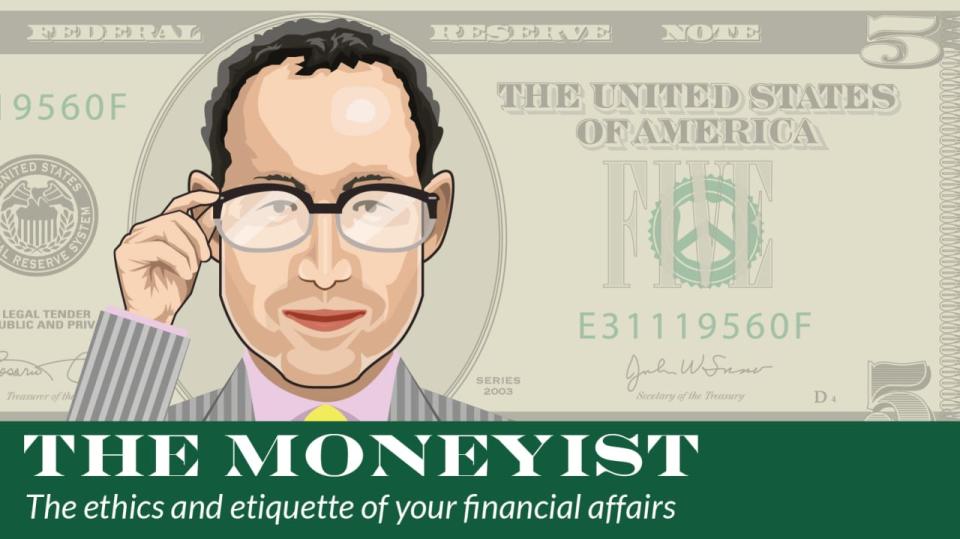Dear Quentin,
I don’t live extravagantly by any means.
I have $68,000 in credit-card debt on four cards, and make minimum payments. The payments add up to $1,800 per month. My salary is $55,000, and take-home is about $3,300 a month. This is my only income. At best I may be able to get my salary up to $70,000 in the next couple of years. I do not have high-income potential. I can’t make it; I dig into savings, of which I have about $75,000, and put more on credit cards each month to pay my bills.
Most Read from MarketWatch
I am divorced, 57 years old and moved my mother, 95, in with me because she was alone. I am her primary caregiver. She has no money, and no assets. She has a small Social Security benefit of which she gives me a few hundred dollars toward our monthly food and gas bills. She did recently qualify for some in-home help during the day, but it’s me at night and on weekends. This combined with my full-time job has taken a toll.
I would love to zap all that credit-card debt with my savings, but that would leave me with next to nothing. Because of a potential emergency with my mother or my health, my house or other unknowns I am paralyzed at the thought of not having cash so I keep using the cards. There’s about $225,000 of equity in my house, but my interest rate now is 2.85% and my mortgage is $250,000 with 27 years left. I have only $50,000 in a 401(k).
I would have to do it. I don’t want to get here again. This is all so stressful — and it’s all I think about. Fortunately, there is a light at the end of the tunnel. I am the future beneficiary of a life estate from my father after my stepmother dies. She is 85. This will be real estate, a stock portfolio and other regular income with current market value for my share at about $2 million. That is, if the economy holds.
Can I live off my paycheck if I have no credit-card payments to worry about?
Seeking Help


Dear Seeking,
Let he who has never ordered a package on Amazon AMZN or used a credit card cast the first stone.
But it’s also time for some tough love. You are borrowing from Peter to pay Paul. Or, put another way, you are borrowing money from these credit-card companies to pay for your groceries and your mortgage. You have the solution in sight. You just need to do it. It’s time to grasp the nettle, and pay off your credit-card debt. Do whatever it takes. But get rid of it. If you continue to catastrophize, you risk making an already difficult situation impossible.
Firstly, you actually have a lot going for you. You and your mother have a roof over your heads, you have food on the table, you earn $7,000 more than the annual median wage in the U.S. and you have a mortgage rate of 2.85%. And you very likely have a $2 million windfall coming your way. This is a lot more than many Americans have. Plus, you have a $75,000 war chest for a rainy day. Here’s the Moneyist’s weather forecast: It’s raining.
So this is what you do: Pay off your credit cards — all four of them — and cut them up. That will leave you with a $7,000 emergency fund. Work out a monthly budget of your income and expenditures — utilities, property taxes, home insurance, mortgage payments, groceries and gas — and, instead of paying $1,800 every month toward credit cards that have a 22% interest rate and risk ruining your credit score, save $500 a month.
Assuming you had a 10% down payment, your current mortgage, excluding property taxes, should not be much more than $1,100 a month. With a net income of $3,300 you should be able to get from the first to the last of the month with money to spare. This $68,000 credit-card debt has become a monster that appears to personify all your fears and insecurities. It’s time to vanquish that dragon, and that day is today.
It’s time for some soul-searching
Your mother is lucky to have you, and I’m sure you are lucky to have her too. In the absence of long-term care insurance, you can look into Medicaid — keep your accounts separate — state and federal financial assistance as outlined in this guide from the AARP, and community support from organizations like the Caregiver Action Network and the National Council on Aging. Family caregivers do $600 billion a year in unpaid work, a figure that does not include lost wages.
You also need to do some soul-searching, in addition to budgeting. Why did you put so much money on this plastic, the most perilous kind of credit? Did you have a hard time after your divorce emotionally and/or financially? What has led you to this state of financial paralysis? Sometimes, if we are familiar with chaotic and challenging emotional life, that is what we are drawn to. It’s time to break that cycle.
It’s not my intention to psychoanalyze you, it’s my intention to spur you to ask these questions and find the answers for yourself so you can (a) understand how you found yourself in this financial “crisis” and (b) feel empowered to change it, given that you do have the means to do so. Unless we acknowledge that our emotional lives and our financial lives are connected, we are doomed to repeating the same mistakes again.
Christine Wilson, writing on the wellness blog, Live Well and Fully, says, “Chaos addiction refers to a pattern where people often find comfort and familiarity in disorderly or chaotic situations. This pattern may originate from past experiences of instability or trauma, leading individuals to unconsciously seek out similar environments later in life. Unlike traditional addictions involving substance abuse, chaos addiction is more about emotional patterns.”
We can have chaotic relationships with other people and, yes, we can also have a chaotic relationship with money. It can take many forms — everything from the impulsive shopper who uses credit cards to momentarily escape the real world to the gambler who will risk their entire livelihood for a roll of the dice. Given your homeownership and clear caregiving abilities, there is very likely another underlying problem that led to $68,000 in credit-card debt.
Here’s a fascinating nugget about impulsive shoppers and what — and why — they do what they do. Their purchases don’t have to be all about luxury items like jewelry or designer clothes; “shopaholics” can get the same kicks from buying everyday items like Clorox or Tide Pods. This study, published in the Journal of Consumer Research, suggested that the process of shopping (and escaping) can be just as exhilarating as that package that comes through the mail.
The complexities of impulse buying
“Consumers who experience a loss of control are more likely to buy products that are more functional in nature, such as screwdrivers and dish detergent, because these are typically associated with problem solving, which may enhance people’s sense of control,” the authors wrote. Another theory: It may be that they are familiar household brands and simply remind them of their childhood. It’s not a judgment: We all do it to some extent or other.
The study found that shopping on even the most boring household items is enough to satisfy the cravings of compulsive shoppers. In one study, participants were asked to recall a situation in which they felt a high sense of control after shopping; they ended up buying more practical products at the supermarket, such as cooking ingredients and household cleaners. This research may or may not resonate with you, but it shows that our psychological relationship to our finances is complicated.
You have shown a lot of strength and you have already come a long way: Believe it or not, not everyone would devote themselves to taking care of their 95-year-old mother or father when they are under so much pressure financially. We need to alleviate the shame and blame around credit-card debt and start asking the tough questions: Not only how to pay off debt, but why we got ourselves into debt in the first place.
The good news is that after you use your emergency fund for this emergency, your credit-card balance will be zero. The same cannot be said for the average U.S. household, which owes nearly $8,000 in credit-card debt, according to the most recent data from the U.S. Census Bureau and the Federal Reserve Bank of New York; in fact, there was an estimated $1.12 trillion outstanding on credit-card balances in the first quarter of 2024, up 13% on a year ago.
We are all guilty of spending too much from time to time, but we must face up to it and take corrective action if and when we do.
More columns from Quentin Fottrell:
Most Read from MarketWatch

Jessica Roberts is a seasoned business writer who deciphers the intricacies of the corporate world. With a focus on finance and entrepreneurship, she provides readers with valuable insights into market trends, startup innovations, and economic developments.






